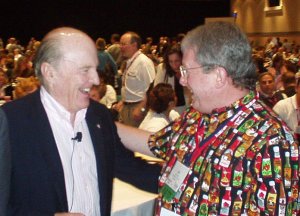
Image Credit: Jay Cross
So just about everyone out there knows who Jack Welch is – he was the CEO and Chairman of GE who lead them from a market valuation of $14B when he took over to a valuation of over $410B when he stepped aside. What many people may not know is that Jack is a great communicator.
Bill Lane who was Jack Welch’s speech writer for over 20 years while he was at GE has written a book called Jacked Up: The Inside Story of How Jack Welch Talked GE into Becoming the Worlds Greatest Company. In it, Lane spills the beans on just how Welch got to be so good at getting his message across.
Probably the most important lesson that Jack Welch taught his speech writer was that self-confidence was the #1 attribute of a leader. With self-confidence you could go out and do nearly anything that you put your mind to. Now this was truly impressive when you realize that Welch had started out as a guy who both stuttered and was very shy. Needless to say, in the beginning Welch HATED to speak in public.
The speeches that were being given at GE when Welch took over were the standard types of speeches that you hear at any company gathering: boring reports on the success of such and such a team / department / division. One day while coming up with the list of speakers for an internal event, Welch called a stop to everything. He spent a few moments thinking to himself, and then he announced that going forward all speeches would be ones that told people what they ought to be doing.
From that point on in GE, everything was changed. All speeches needed to contain a learning point, a warning to others, some sort of insight, or something useful like a new technique or the speech didn’t get made.
There was an amazing side benefit to this new speech policy. Almost across the board the presenters at these internal events became much better speakers. Why? Probably because they knew that they had something interesting to say. When they knew that the audience was going to be interested in what they had to say, they were filled with self-confidence and this just naturally made them better speakers.
So what does all of this mean to us accidental communicators? Simple, we need to stop giving boring speeches that are simply reports on what we’ve been doing. Instead, we need to look inside ourselves and discover what our audiences really want to hear about.
Keep in mind, what people want to hear most is your stories. The stories that tell them what you know, what you have done, what you have see, and what they might find useful in someway. Not only are your stories interesting to them, but hearing a story also helps people to remember and retain what you have told them. Instead of having your message go in one ear and out the next, now it will actually stick!
Lane makes one final point in his book: Jack Welch always insisted that speakers give their audience the very best of their thinking. If you can do this, then your audience will respond by taking your message to heart.
When you get up to give a speech, do you feel as though you are filled with self-confidence? How does this impact the quality of the speech that you are giving? Do you talk about things that you’ve learned or are you just giving reports to your audience? What could you do differently to make more of an impact? Leave me a comment and let me know what you are thinking.
